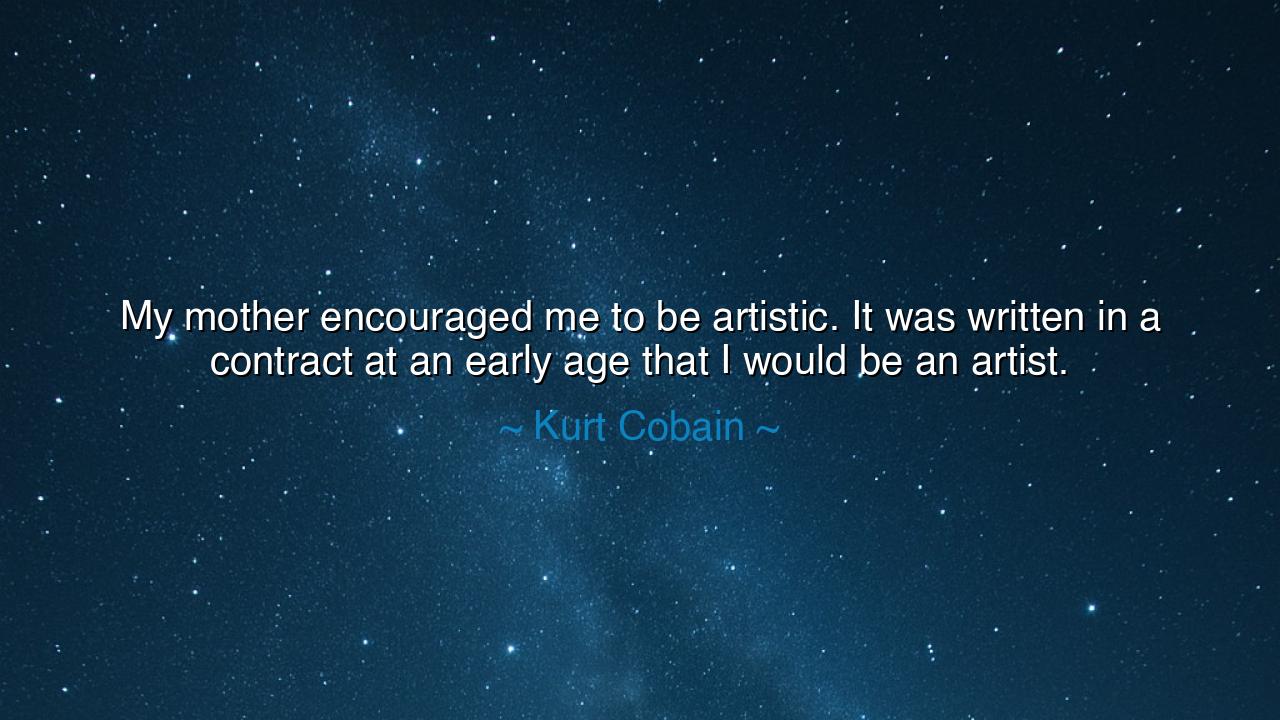
My mother encouraged me to be artistic. It was written in a
My mother encouraged me to be artistic. It was written in a contract at an early age that I would be an artist.






In the days when the flame of the soul still sought its own shape, the words of Kurt Cobain were like the whisper of an oracle: “My mother encouraged me to be artistic. It was written in a contract at an early age that I would be an artist.” These words are not mere recollection—they are prophecy. They speak of destiny acknowledged before the world could name it, of a sacred pact between a soul and its calling. For to be artistic is not merely to create—it is to bear witness to the beauty and agony of existence itself, to translate suffering into song, and longing into form.
In Cobain’s time, the world he saw was both vibrant and decaying, filled with color yet heavy with silence. His mother’s encouragement was not a casual blessing; it was a declaration that the path of art, though fraught with pain, was the truest expression of his being. The “contract” he speaks of is not one of ink and paper—it is a spiritual covenant, written in the marrow of his bones. From childhood, he was chosen by the muse, and though the path led him through storms, it was his truth. Many souls wander without such a promise; he was burdened and blessed by it.
Such words remind us of the young Leonardo da Vinci, whose father, seeing the boy’s sketches upon scraps of stone, took him to Florence to study under Verrocchio. There too, a parent recognized the divine mark upon a child and chose not to smother it beneath duty or fear. In that act of recognition, a lineage of beauty was preserved, and the world was changed forever. So too with Cobain—his mother’s belief became the wind that pushed him toward creation, even when creation meant destruction.
There is something ancient in this pattern: the artist as the chosen vessel, the parent as the witness to fate. From Orpheus to Van Gogh, from Sappho to Sylvia Plath, the artist walks a narrow bridge between madness and meaning. And yet, each of them began as a child who was believed in. That belief is the spark that lights the eternal flame of art. Without it, the divine ember dies unseen.
But we must not mistake Cobain’s words for self-pity or arrogance. His “contract” is not a boast—it is a lament and a vow. To be an artist is to carry the weight of the world’s unspoken sorrows and to give them voice. It is to wake in the night and wrestle with shadows that others ignore. It is to create not for applause, but because silence would be unbearable. Such is the ancient burden of those who are born to see too deeply.
From this, let us draw a lesson: that each person bears within them a covenant of creation. For some, it may be with music or paint; for others, it may be with compassion, invention, or courage. To live well is to discover the contract written in one’s own soul—and to honor it. Parents, mentors, and friends must listen closely, for they are often the first to hear the whisper of destiny in another’s heart.
So, to those who hear these words: seek your inner calling as Cobain did, not for fame, but for truth. Write your own “contract” in your spirit, promising that you will not betray your gift. Let your art—whatever form it takes—become your offering to the eternal. And when the world grows heavy and doubts arise, remember this ancient wisdom: that destiny is not found in the stars, but written in the quiet agreements we make with ourselves when our hearts are young and our souls still burn with wonder.






AAdministratorAdministrator
Welcome, honored guests. Please leave a comment, we will respond soon